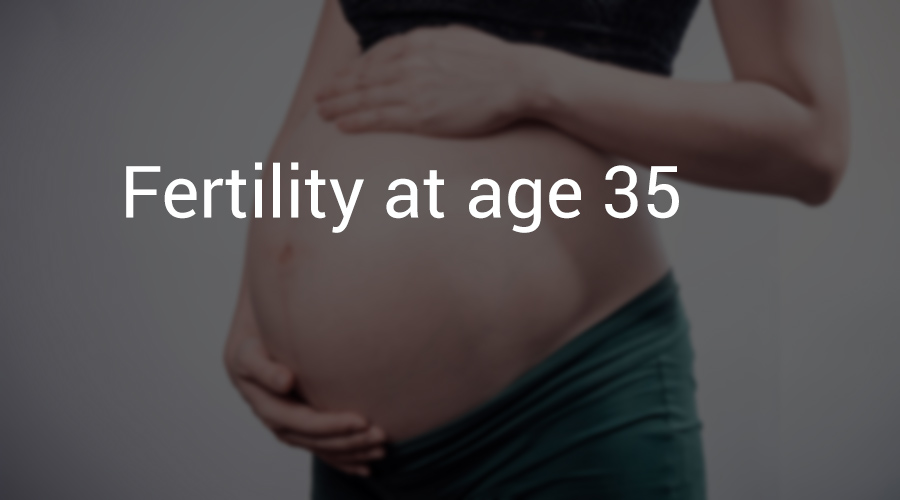If you are 35 or older and have been trying to conceive without success, you may be wondering what your options are. You may feel like you are running out of time, but don’t worry – there are still things you can do to increase your chances of getting pregnant. In this blog post, we will discuss some tips for increasing fertility at age 35 and beyond. Keep reading to learn more!
Fertility After 35
The first thing to keep in mind is that fertility declines with age. This means that your chances of getting pregnant are lower after 35 than they are at younger ages. However, this doesn’t mean that it is impossible to conceive after 35 – it just means that you may need to be a little more proactive about trying to get pregnant.
What Is Fertility?
Before we discuss how to increase your fertility, let’s take a moment to define what we mean by “fertility.” Fertility is the ability to conceive a child. It is determined by both men and women and can be affected by a variety of factors. If you are having difficulty conceiving, it may be helpful to consult with a fertility specialist to determine the root of the problem.
Why Does Fertility Decrease With Age?
There are a number of reasons why fertility decreases with age. For women, the most common reason is declining egg quality. As women get older, their eggs become more and more damaged, which can make it difficult to conceive. Additionally, the lining of the uterus may thin out over time, making it harder for an embryo to implant.
For men, declining fertility may be due to a decrease in the number of sperm cells or a decrease in their ability to swim properly. Additionally, older men are more likely to have chromosomal abnormalities in their sperm, which can lead to birth defects.
How Aging Affects Fertility
| Age | Men’s Fertility | Women’s Fertility |
| 25 | Peak fertility | Early twenties |
| 30 | Sperm count begins to decline can still father children | Late twenties/early thirties |
| 35 | Decline in quality of sperm | number of eggs declines sharply Mid-thirties |
| 40 | Sperm count continues to decline | eggs are of poorer quality Late thirties/early forties |
| 45 | No sperm production | eggs are no longer viable Early forties/late forties |
| 50 | No sperm production | Menopause Begins in early fifties |
Tips To Stay Possible For Getting Pregnant At 35

Stop Smoking And Unhealthy Habits
Giving up smoking and cutting down on alcohol are two of the most important things you can do to improve your fertility. Smoking has been linked to a number of health problems, including infertility. Alcohol consumption can also have a negative impact on fertility, both in men and women. So if you are trying to conceive, it is important to stop smoking and drinking alcohol.
Get To The Healthy Weight
Another important step you can take to improve your fertility is to reach a healthy weight. Being overweight or underweight can affect your ability to conceive. Carrying too much weight or being too thin can disrupt your menstrual cycle and make it difficult to ovulate. Conversely, being obese can lead to problems with sperm count and quality. So if you are trying to get pregnant, it is important to reach a healthy weight.
Physical Activity
In addition to eating a healthy diet, getting regular exercise is important for improving fertility. Exercise can help to improve your overall health and increase your chances of conceiving. It is especially important for women to get regular exercise, as being inactive can lead to weight gain and other health problems that can impact fertility. So if you are trying to conceive, make sure to get plenty of exercises.
Watch On The Hormones
In some cases, fertility problems may be caused by hormone imbalances. If you think that your hormones may be to blame, it is important to see a doctor. They can help to diagnose the problem and recommend ways to correct it. In many cases, hormone imbalance can be corrected with medication or surgery. So if you are having trouble getting pregnant, it is important to see a doctor to rule out hormone imbalance as a possible cause.
How To Increase Fertility After 35

For Women:
- Try to conceive during your fertile window. The fertile window is the six days leading up to and including ovulation. To determine when you are most fertile, you can use a fertility calculator or monitor your basal body temperature.
- Consider using ovulation prediction kits or fertility monitors. These tools can help you to pinpoint when you are most likely to ovulate, which will help you to time intercourse correctly.
- Eat a healthy diet and get plenty of exercises. Eating nutritious foods and staying active can help to improve your overall health and increase your fertility.
- See a fertility specialist. If you have been trying to conceive for more than six months without success, it may be helpful to consult with a specialist. They can help you to determine the root of the problem and suggest ways to improve your chances of getting pregnant.
For Men:
- See a urologist. If you are having difficulty conceiving, it may be helpful to see a urologist to rule out any potential medical problems.
- Make sure you are healthy overall. Men who are in good health generally have better fertility outcomes than those who are not. This includes eating a healthy diet and getting regular exercise.
- Reduce your alcohol consumption. Too much alcohol can have a negative impact on male fertility.
- Avoid smoking and tobacco products. Tobacco use is also known to have a negative effect on male fertility.
Supplements
If you’ve been looking for information on how to get pregnant after 35 or beyond, you’ve undoubtedly come across supplements and “natural cures” that claim to “reverse” ovarian women’s age.
There are presently no validated supplements or fertility treatments available to reverse or “undo” ovarian aging. The majority of these items on the market have either no research behind them, only preliminary studies to back them up, or are simply old tales. Scammers operate a number of websites that attempt to defraud men and women wanting to conceive.
DHEA supplementation may improve IVF success in women over 40 who are undergoing assisted reproductive technology. DHEA supplementation increased the chance of pregnancy and reduced the risk of miscarriage, according to a 2018 meta-analysis of several studies. However, DHEA intake can induce hormonal imbalance. It should not be used without expert advice.
Every woman should take folate, often known as folic acid, as a fertility supplement. While you should always consult with your doctor before taking any fertility pill, getting enough folate is critical for avoiding certain birth defects and may help prevent pregnancy loss.
Medical Therapy
Clomid or Serophene
The drug clomiphene citrate (Clomid) has been used for more than 40 years. It’s available if you’re not ovulating properly.
Clomid and Serophene are estrogen-blocking medications that are named for their ability to block estrogen. The hypothalamus and pituitary gland in your brain generate hormones called GnRH (gonadotropin-releasing hormone), FSH (follicle-stimulating hormone) and LH (luteinizing hormone). These chemicals signal your ovaries to produce eggs.
Human chorionic gonadotropin (hCG), such as Novarel, Ovidrel, Pregnyl, and Profasi, is one of the most common fertility medications. This drug is commonly used in combination with other fertility treatments to stimulate your ovaries to release an egg.
Follicle-stimulating hormone (FSH), such as Bravelle, Fertinex, and follistim, and Gonal-F are examples of follicle-stimulating hormones. These medicines cause your ovaries to produce eggs.
Human menopausal gonadotropin (hMG), such as Menopur, Metrodin, Pergonal, and Repronex. FSH and LH are combined in this medicine (luteinizing hormone).
Gonadotropin-releasing hormone (GnRH), such as Factrel and Lutrepulse, is another option. This hormone instructs your pituitary gland to release FSH and LH from your gonads.
“Gonadotropin-releasing hormone receptor (GNRH) agonist,” such as Lupron, Synarel, and Zoladex, are examples of medication that stimulate the release of growth hormones from the pituitary gland.
Gonadotropin-releasing hormone antagonist (GnRH antagonist), such as Anti and Cetrotide, is a term used to describe drugs that prevent the body from making hormones.
Antagon. It’s a medicated shot that inhibits ovulation in women who are undergoing fertility treatments. Stomach discomfort, headaches, and possibly miscarriage can all occur as a result of the medication.
Dostinex and Parlodel. These are medicines that target hormone levels and shrink a pituitary tumor, which may be the cause of your ovulation issues. You usually take them by mouth in tiny doses, but the amount can be increased if your doctor recommends it. Dizziness and an upset stomach are some of the side effects.
Does The Partner Health Important?
Yes, male fertility is just as important when trying to conceive. In fact, about half of all infertility cases are due to the man’s reproductive health. Some things that can affect male fertility include:
- Tobacco use
- Alcohol consumption
- Obesity
- Lack of exercise
- Exposure to heat or radiation
- Environmental pollutants
All of these factors can damage sperm and reduce fertility. For best results, both partners should try to live a healthy lifestyle and avoid any harmful behaviors. See your doctor if you have any concerns about your fertility. He or she can help you get started on a treatment plan that’s right for you.
When To Visit The Doctor?
If you are over the age of 40 and have not been able to conceive after six months of trying, make an appointment to see your doctor right away. This is not a set-in-stone rule, as everyone’s body reacts differently. However, it is important to get started on treatment as soon as possible if you want to increase your chances of getting pregnant.
Your doctor can do a number of tests to determine the cause of your infertility and start you on the path to becoming a parent. There are many available treatments for those who wish to become parents later in life. Don’t be afraid to ask for help – that’s what doctors are there for!
Conclusion
Infertility is a common issue that affects many couples. The good news is that there are many treatments available to help you conceive. There are also steps you can take to increase your chances of getting pregnant, such as living a healthy lifestyle and avoiding harmful behaviors. Make an appointment with your doctor if you have been trying to conceive for over six months and have not had any success. He or she can help you get started on a treatment plan that’s right for you. Thanks for reading.
Frequently Asked Questions
Is It Possible To Maintain Fertility After 35?
Yes, it is possible to maintain fertility after 35. However, your chances of getting pregnant decrease as you age. This is because the quality and quantity of eggs decrease over time. There are many treatments available to help you conceive, so don’t be afraid to ask for help if you are having trouble becoming pregnant.
How To Boost Fertility After 35?
There are many things you can do to boost your fertility after 35. Some of these include:
- Staying at a healthy weight
- Exercising regularly
- Avoiding tobacco and alcohol use
- Limiting exposure to environmental pollutants
- Taking care of your reproductive health
Does Supplements Can Help To Boost Fertility After 35?
There is some evidence that supplements can help boost fertility after 35. However, more research is needed to confirm this. There are many different supplements available, so speak with your doctor to see if one may be right for you.




